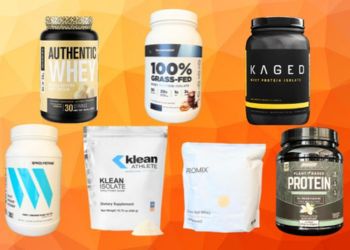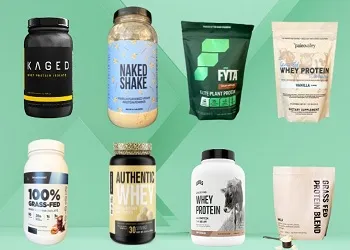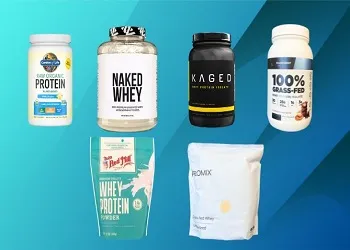Creatine supplements have been widely studied and shown to improve anaerobic exercise performance, increase muscle strength, and power output.
Many individuals choose to incorporate creatine into their fitness routine to maximize their training efforts and achieve their desired results. However, individuals who are practicing intermittent fasting or fasting for other reasons often question, “Does creatine break a fast?”
In this article, we’ll cover what creatine is, the benefits of creatine supplements, how much creatine you should take, and whether taking creatine breaks a fast or causes an insulin spike.
Table of Contents
What Is Creatine?
Creatine, which comes from the Greek word “kreas” meaning “meat”, is a naturally occurring compound found in our muscles, primarily obtained through dietary sources like meat and fish.
Creatine is also produced in the human body and plays a vital role in energy production during high-intensity exercise, making it a popular supplement among athletes and fitness enthusiasts.
Studies have shown that creatine supplements can enhance strength, help increase muscle mass, and improve exercise performance.

Does Creatine Supplementation Break Fast?
No, taking creatine would not break your fast. Creatine in its pure creatine monohydrate form does not contain any calories and therefore would not constitute breaking your fast.
However, it’s important to note that some creatine supplements may contain additives or flavorings that could have calories. Checking the product label is crucial to ensure you’re not consuming additional calories during the fasting period.
It is important to bear in mind that when you are doing high-intensity exercise, you will perform better when glycogen stores are available which are more readily available close to a mealtime. Consequently, scheduling such workouts during your eating window is advisable. This approach not only enhances performance but also eliminates concerns about the timing of creatine supplements, as they can be seamlessly integrated within the designated eating window.
How Does Creatine Work While Fasting?
Creatine’s Biological Synthesis
To understand how Creatine works while fasting, we need to grasp its biological synthesis. Our bodies naturally produce creatine in the liver, kidneys, and pancreas, combining the amino acids arginine, glycine, and methionine.
Once synthesized, Creatine is transported to our muscles, where it’s stored as phosphocreatine and used as a readily available energy source during intense physical activities.
When you supplement with creatine, stores of phosphocreatine will increase. This stored form of energy in the cells will produce more adenosine triphosphate (ATP), the body’s energy currency. The more ATP the better your body will perform during exercise. This will then provide a key energy source for high-intensity exercise or heavy lifting.

Creatine and Fasting
Fasting is the practice of abstaining from food and calorie intake for a specific period resulting in insulin levels dropping.
Studies suggest that fasting may decrease insulin levels, which could affect Creatine absorption. However, the exact effects of fasting on Creatine uptake are still a subject of ongoing research, and individual responses may vary.
When fasting, the body relies on stored energy sources, such as glycogen and fat, to sustain its functions.
Creatine, while not a direct source of energy, enhances the body’s ability to produce ATP during brief, intense efforts, such as weightlifting or high-intensity interval training. This means that even during fasting, creatine can support performance and help individuals maintain muscle strength and power.
What Is Considered Breaking a Fast?
The definition of breaking a fast can vary among individuals and depends on the goals of the fasting protocol. Generally, consuming calories or substances that stimulate an insulin response is considered breaking a fast.
In the context of creatine, its minimal impact on insulin levels suggests that it may not interfere significantly with the physiological benefits of fasting.
Does a Creatine Supplement Spike Insulin?

One concern among individuals practicing intermittent fasting is the potential for certain supplements to spike insulin levels, disrupting the fasting state.
Insulin is a hormone that regulates blood sugar levels, and elevated insulin can inhibit fat burning, a key goal of many fasting protocols.
Research indicates that creatine does not significantly impact insulin levels when consumed alone. Studies have shown that creatine supplementation does not result in a substantial increase in insulin secretion, making it a viable option for those aiming to preserve the benefits of fasting.
The Best Time to Take Creatine Supplements During Intermittent Fasting
Timing plays a role in optimizing the benefits of creatine, especially when practicing intermittent fasting. While there is no one-size-fits-all answer, taking creatine during the feeding window or around workouts can be beneficial. This ensures that creatine is available when the body needs it most, supporting energy production during exercise.

Tips for Maximizing the Benefits of Creatine Supplements and Intermittent Fasting Together
- Stay Hydrated: Creatine may cause an increase in water retention within muscle cells. Staying well-hydrated can help mitigate this effect and support overall health.
- Combine With Proper Nutrition: While creatine itself may not break a fast, it’s essential to pair it with a balanced and nutritious diet during the feeding window to maximize its benefits.
- Monitor Individual Response: Everyone responds differently to supplements, and individual factors such as metabolism and health conditions can influence the impact of creatine on fasting. Regular monitoring and adjustments can help tailor the approach to specific needs.
Benefits of Creatine Supplementation
The wealth of research on creatine underscores its primary benefits in the following ways:
- Enhances strength and power output
- Modestly increases lean mass when paired with resistance exercise
- Reduces body fat in trained athletes
- Enhances stored energy
- Improves high-intensity exercise performance
- May alleviate mental fatigue, especially in high-stress situations involving sleep deprivation or exhaustive exercise
- Enhances certain aspects of memory, particularly for individuals with lower baseline creatine levels, such as vegetarians and older adults
- Preliminary findings even hint at a potential role in alleviating symptoms of depression in individuals with major depressive disorder or bipolar disorder. Despite these intriguing possibilities, further research is essential to establish creatine’s effectiveness in cognitive performance and mental health comprehensively.
It’s important to note that individual responses to creatine supplementation may vary, and consulting with a healthcare professional or nutrition expert before starting any supplementation is advisable, especially for those with pre-existing health conditions.
How Much Creatine Should I Take?

Determining the appropriate dosage of creatine supplement can depend on various factors, including your body weight, muscle mass, and overall health.
It’s essential to consult with a registered dietitian or healthcare professional who can assess your individual needs and provide personalized recommendations. However, as a general guideline, many individuals follow a common creatine supplementation protocol.
Some people choose to start with a loading phase, typically involving taking 20 grams of creatine per day (divided into four doses) for 5-7 days. This phase is intended to saturate your muscles with creatine.
Following the loading phase, a maintenance phase involves taking a lower dose of creatine, typically around 3-5 grams per day, to sustain elevated creatine levels in the muscles.
Takeaways
Creatine is a very popular supplement for gym goers because of its benefits in helping to boost strength, increase muscle mass, and improve exercise performance, but many aren’t sure if it can be taken during fasting.
Creatine is a calorie-free non-proteinogenic supplement that does not invoke an insulin response. Taking creatine supplements alone will not break a fast, even if you are partaking in strict time-restricted fasting.
If you are interested in finding out what the best creatine supplements are on Amazon, we have a blog post covering this.
Frequently Asked Questions
Does creatine affect autophagy?
Autophagy is a cellular process that involves the removal of damaged or dysfunctional cellular components. While there is limited research on the direct impact of creatine on autophagy, current evidence suggests that creatine is unlikely to interfere with this process. Autophagy is primarily influenced by factors such as nutrient deprivation, and creatine’s minimal impact on insulin levels indicates that it may not significantly affect autophagy during fasting.
Does creatine kick in fast?
Creatine does not provide an immediate, noticeable effect like caffeine, for example. The benefits of creatine, such as enhanced energy production during high-intensity activities, become apparent over time with consistent supplementation. It’s not a quick-acting substance that produces immediate results, but rather a supplement that supports long-term physical performance and muscle growth.
What do Dietitians say about Creatine?
Dietitians generally view creatine as a safe and effective supplement for many individuals, especially those engaged in intense physical activities. However, they emphasize the importance of individualized recommendations, hydration, and consideration of dietary sources, especially for those with specific health conditions. Consulting with a registered dietitian is advisable to receive personalized guidance based on your unique health and fitness circumstances.














